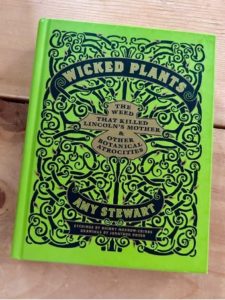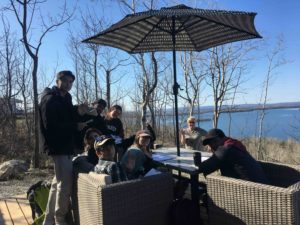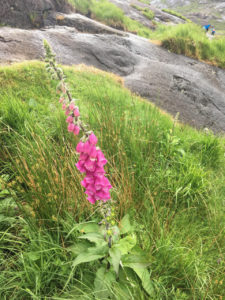Advent Botany Day 10: Wicked Plants by Amy Stewart
This guest post is by the versatile, talented, Dr. Fallon Tanentzap
 Wicked Plants - The Weed That Killed Lincoln’s Mother & Other Botanical Atrocities (2009) by Amy Stewart is nothing short of a multi-award winning tour-de-force of a page turner. The book is petite and decorative but absolutely fabulously “Wicked”. Shout out to Gregory Maguire’s main character “Elphaba” from another series that I recommend to everyone, but it's not on the topic of Advent Botany I’m afraid.
Wicked Plants - The Weed That Killed Lincoln’s Mother & Other Botanical Atrocities (2009) by Amy Stewart is nothing short of a multi-award winning tour-de-force of a page turner. The book is petite and decorative but absolutely fabulously “Wicked”. Shout out to Gregory Maguire’s main character “Elphaba” from another series that I recommend to everyone, but it's not on the topic of Advent Botany I’m afraid.
Check out Wicked Plants' front cover artwork (left), with its golden lettering on top of the perfectly wicked shade of green. The pages of Stewart's book include more gorgeous artwork and sketches with gold decorative print and would make a great conversation starter for anyone on your gift list this year.
Anyone with a few minutes to spare can peruse the pages of this delightful yet extremely informative book with its foreboding messages of caution. Stewart sorts the various “wicked” plants into categories such as "deadly", "painful", "dangerous" and "illegal" in this compendium of plants and their effects on people. She also includes other plants in the same plant families that cause similar effects to provide more botanical bang for your buck! As well, Stewart highlights historical cases in which plants ended up being the culprit in the untimely and unfortunate passings of patients.
Take home: never underestimate the effects your food, or garden plants can have on you.

Dawn couldn't resist adding a photo of Fallon giving a guest lecture in my 2022 back to in-person field course
While I was a graduate student, I was fortunate to assist in teaching an Ethnobotany class for four years to young, inspiring pre-med students. In the course, students learned about plant families and the common biochemical compounds found within their member species.
If Wicked Plants are your cup of tea then you will probably enjoy the class textbook, Economic Botany - Plants in Our World by Beryl Britnall Simpson and Molly Conner Orgorzally.
Beyond the slightly morbid fascination with the subject that comes from Stewart's recounting of the historical casualties, in my view, everyone will benefit from learning these informative factoids because many of these plants are quite common. To be honest, I can’t count how many times I have had to stop my kids (husband included) from trying to eat or even touch that not so “friendly” or as Stewart says “wicked” plant out on our walks.
Plants are powerful, and contain many different compounds. Either useful ones like the caffeine in Coffee (Coffea arabica) or toxic ones in Foxglove (Digitalis sp.). But overall I would have to say that, like the wicked witch of the west….. maybe they are not as bad as we think.
References:
Stewart, A. (2009). Wicked Plants - The weed that killed Lincoln’s Mother & Other Botanical Atrocities. Algonquin Books of Chapel Hill.
Maguire, G. (1995) Wicked - The life and Times of the Wicked Witch of the West. Regan Books, Harper Collins.
Simpson, B.B. & Orgorzaly, M.C. (2001) Economic Botany - Plants in our World. (3rd Edition) McGrawHill.
Advent Botany Days 6 to 8
We hope you're enjoying this year's revival of Advent Botany. In the new "take" we are sharing some of our favourite plant-themed books (old and new) that we think make great Botanical Book Gift Suggestions for everyone, from casual plant admirers, to citizen scientists, to history fans, to very nerdy botanists, of all ages.
- Day 8: Introduction to Ecological Biochemistry by Jeffrey Harborne FRS recommended by Alastair Culham on Twitter
- Day 7: A Rum Affair - Karl Sabbagh recommended by Alastair Culham on Twitter
- Day 6: The Plant Hunter by TL Mogford recommended by Nigel Chaffey on Twitter


